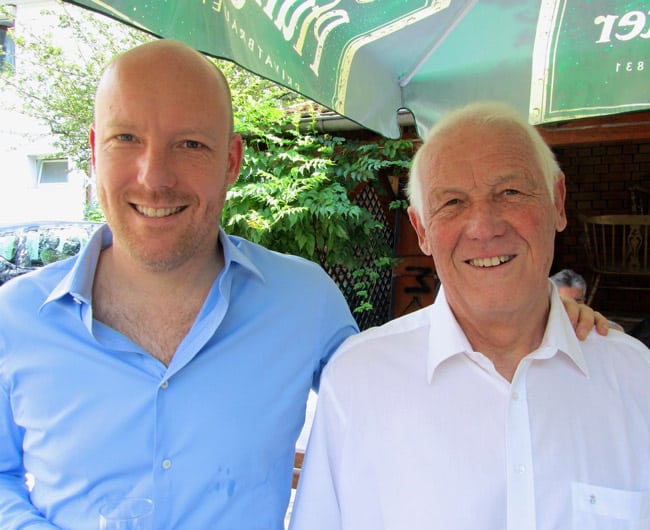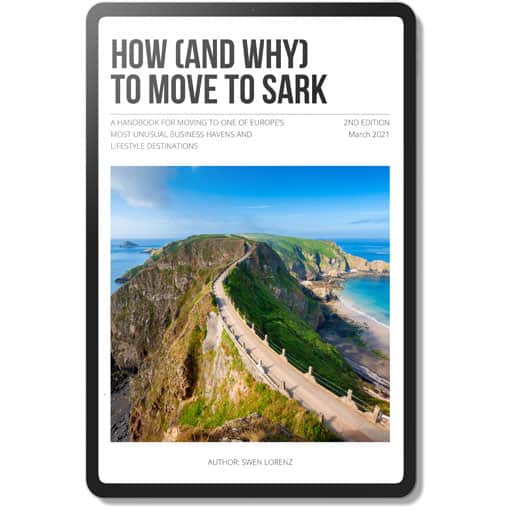Though it’s also one that we should all become better at talking about. In much of Western society, death is still taboo. We will all be confronted with it inevitably, and I wish that I had investigated it earlier or that someone had shared some wisdom with me – over and above that age-old stereotype about “carpe diem”.
This article is relevant to anyone whose parents are both alive, but it’s also something quite different from what I usually publish. Are you ready for it?
Some context about my father
My dad, Heribert Lorenz, passed away from pancreatic cancer on 7 June 2016.
We always had a good, albeit distant, relationship. I moved out from my parents at age 19 and have lived elsewhere ever since. I visited every quarter or so, but I was definitely the family member that lived at a distance.
In 2014, he was diagnosed with pancreatic cancer. It’s the cancer that you definitely don’t want to catch. Within five years, >90% of sufferers die. On top of these unfavourable odds, pancreatic cancer taking you out is quite simply a nasty affair.
Not that I would have known any of this back then, because my parents played down the entire affair. They are of the generation that didn’t want to be a burden on anyone, and instead of worrying others, they preferred to deal with it quietly.
In retrospect, I took my dad’s diagnosis anything but serious enough. Obviously, in situations like this, there is also an element of wanting to believe it if someone downplays the threat.
Following the diagnosis, my dad had a massive operation where doctors removed various bits and bobs, including organs, some of which I did not know what they were designed to do. Medication, restrictions on what he could eat, and pain became permanent features in his life. However, it also got him back to a state of relative normality, at least on the outside.
Case in point, check the last happy photo I have with him. In July 2015, he organised a big summer party for friends and family. You wouldn’t think this is the photo of someone who was effectively at death’s door, would you?

Little did I know.
Christmas 2015 was entirely normal, at least on the outside. He gave me EUR 10,000 as a gift, which was about 20 times as much as I would have typically received. Bestowing material things on his children was his way of expressing his love, as I fully realise now. Back then, I just thought that was a rather considerable step-up compared to previous Christmas gifts. He knew.
By March 2016, he was gravely ill.
By April 2016, he was back and forth in hospital, twice involving an ambulance.
Within a few short months, he deteriorated from a seemingly normal person to someone who we expected to die any day (though he then clung on for two more months).
On 7 June 2016, he passed away at a hospice near where he spent his entire life. He had been brought there just one day before, after several months laying in one of just ten beds available in a highly specialised ward at the highly specialised clinic in Heidelberg.
For the following seven points, you needed to have all this information for added context.
Losing a parent is an extremely powerful experience, more so than anyone else dying.
Here is what I learned from it all.
1: A pre-announced death is a gift
Like many others, I had always assumed it was preferable if death knocked someone (or yourself) out very quickly. No warning, no pain, just get it done. No one wants to linger around in pain, be a burden to others in terms of care, and make family members waste their precious time going through this process with you.
Right?
I now know the exact opposite is the case.
My father and our family and friends had time for a last visit, a final chat, and parting with well-wishes.
It was a painful process, but I came to call it a period of pre-mourning. Death is hard to conceptualise, and it violates emotional logic, but a death witnessed is a lot easier to comprehend. Come the time that person actually dies, and you will have already processed a lot of it. You may even be prepared to make the funeral more of a celebration of someone’s life than the sober affair we tend to treat it as.
In any case, I have come to be extremely grateful for this period, difficult as it all was.
If or when you are going through something similar, treat it as a gift if there is a longer process involved. The longer-term benefits far outweigh the short-term difficulties.
2: The overlooked aspect of “carpe diem” that really matters
My dad was 76 when he passed away. By today’s standards, that’s not particularly old. It was also three years short of what he had hoped to still have left following his diagnosis (as I know now).
Still, he said on his death bed: “I had a good run.”
He never complained a single time and only spoke of how he had had a good life.
As you can imagine, it looked and felt like his good life up to that point made it easier for him to let go. However, something else may be just as important.
For him to have felt that he had lived a full life made everything easier for those around him.
If there’ll be anyone around my deathbed, I’d love to be able to express clearly to them that I felt it had been a good run indeed. Anything you can do to make the entire affair easier for those who remain behind should be considered a priority.
That’s carpe diem made relevant for everyone else around you, instead of yourself.
3: The lesson only the death of a parent will teach you
I have had other family members pass away before and people who were friends, colleagues or acquaintances.
Nothing prepares you for the death of the first one of your parents. It’s life-altering.
Death, however tragic, can bear hidden gifts for the living.
Besides everything else that it means, it also conveys the message that your generation will be next to check out. It may yet be a long time away, but you will not anymore be able to ignore that there is an end to this road. You. Are. Next.
You suddenly take account of how long the likely rest of your life will be, what you can feasibly do during that period, and what you may not be able to achieve anymore because of life’s finiteness.
Let’s just say it has turbo-charged my life. Once you have realised that – indeed – there is a limited amount of it left, you become acutely aware of the need to optimise time.
Take that from someone who had already been obsessed with optimising time.
It’s an insane shift in perception. It’s very, very powerful. With a consciously positive undertone, I’d say this is a real blessing of an experience. Death, however tragic, can bear hidden gifts for the living. In his demise, my dad taught me a lesson that I could have learned no other way.
4: It’s never too late to make up for lost opportunities
In line with not wanting to be a burden to anyone, my parents had downplayed the need for me to travel to Germany. Combine that with me wanting to believe that it wasn’t all that serious (yet), and with how suddenly things deteriorated. As a consequence, I got there relatively late in the process.
After landing in Germany, I called my mum from my mobile to update her about my likely arrival time. The sound of her voice suddenly made me realise: “F***, this is serious.”
When I met her at the hospital entrance, I immediately realised from the look on her face what was up: “He wants to see you one last time.”
I struggled for a few seconds to recognise my dad. At first sight, the man who was attached to numerous apparatuses in a hospital bed had only the faintest resemblance to the man I had last seen at Christmas a short four months earlier. He was skin and bones, like the folks you will have seen in black and white images after the liberation of concentration camps. At Christmas, he had still looked the same as in the photo above. I recognised him primarily from the look of his eyes.
He was delighted to see me and visibly eager to say that since we had never hugged each other, he’d love to give me a hug.
The following weeks and months were the closest our family had ever been. That changed so much, and it’s why I put down as #1 point that having this period to actively walk through the end of someone’s life is incredibly valuable and a privilege. He was a miserable-looking creature for that entire period and mostly unconscious or delirious. But it provided the opportunity to create something that made a massive difference to everyone.
Though ideally, if you recognise a bit of yourself in all this, it’s even better if you don’t leave it until quite so late.
5: Our healthcare system needs a rejig
My dad had the luck of getting into one of the most high-tech care units in the country. These were the ten best beds to end up in if you needed care for this particular cancer.
But his case was also, to some extent, the misfortune of another patient. After it had become clear that he would die soon, they should have moved him elsewhere to free up the bed for someone who needed specialised treatments. However, they couldn’t move him anymore. He was too fragile, there were no hospice beds available elsewhere and a few other difficulties that I can’t remember.
He used this bed for nearly three months, the last two of which he really shouldn’t have been there. Someone else may not have gotten the best care because the system was clogged.
During this final period, he must have cost the healthcare system a multiple of what he had cost during the previous 99% of his life. It’s financially unsustainable, and my dad was the first to say the he would have much preferred to “check out” earlier (no pun intended).
Is this the best that one of the world’s most affluent societies can do?
This is a very complex and difficult conversation, but with our ageing population and increasing ability to extend the last phase of life through technology, we need to face up to it somehow. I don’t have answers for it, but these circumstances felt incredibly wrong and outdated to me.
Why not carefully explore new options for these big questions?
Everyone who reads this and is in a position to get this subject to move forward, please do. It’s the point that made me think in the first place that I should write all this down and make my tiny contribution to the conversation in the public square.
6: Last words truly matter
There is that cinema stereotype of someone uttering some last and final words on their deathbed. It’s always terribly meaningful. Nowadays, some of this stuff even makes it into memes. Steve Jobs’ famous last words, even though they are entirely fake and fictitious, keep appearing in my LinkedIn newsfeed. People are rightly fascinated by it.
On the last of my multiple visits throughout these months, my dad’s final words to me when I said goodbye to fly back home were: “Good luck.”
As it turned out, these were really his two very last words to me.
I know that he really meant it, and I have been grateful and extremely happy ever since that he gave me this final well-wishing. It’s also short enough to remember. Imagine he had said a long sentence. I would now be upset about not remembering the exact wording.
If you get a chance, when it’s your turn, please try to bestow a similar gift upon your loved ones.
Ideally, keep it simple! As you can see, you’ll be remembered for it all the more.
7: Don’t leave behind a mess
My parents had been married for 44 years. There was a whole lifetime of accumulated possession and arrangements to go through. My mum would not have been the ideal person to deal with some of these aspects, such as finances, taxes, and banks.
My dad left everything behind in impeccable order.
Not inside a laptop that no one had a password to, but mostly in hardcopy and neatly filed away in a logical order with legible handwriting.
Seriously, losing someone and having to get rid of some physical possessions is hard enough. Cleaning up someone’s mess without that person being around anymore to ask questions is one pain in the arse.
Don’t be a dick. Keep it tidy, please!
I am an anti-clutter person anyway but that subject has definitely moved up in my mind since.
Oh, and a final tip…
There is something I have never entirely understood. It’s that of family and friends gathering around someone’s coffin to bode farewell to the lifeless body. Luckily, I had never even gotten close to being in circumstances where I had to do that. The idea never appealed to me to have someone’s dead body in a coffin as the last and final memory of that person. There are better final memories to be had if you are lucky enough; see above.
Don’t be a dick. Keep it tidy, please!
What little was left of my dad’s body by the time he got stuck in hospital was already fairly miserable in its overall constitution. Let’s just say the following two or three months didn’t exactly help with preserving the body after he died.
The morgue rang to say that his body had gone into decomposition so quickly that they strongly advised against visiting his coffin.
So, on top of all the other luck I had up to that point, I was also lucky enough not to have to go through a visit to the open coffin. I simply do not want to remember anyone as a corpse.
To this day, I am still extremely happy that it worked out like that. If you can (and family dynamics around this are likely tricky), keep something else as your last memory.
As to everything else, there is the old saying that none of us will make it out alive. If you play your cards wisely and you have a bit of luck, your parents can teach you some valuable lessons in this regard. I hope sharing mine made you feel like these last few minutes of reading this article were time well spent.
There is a great 9-minute video of Joe Rogan speaking about this very subject. It’s fantastic! If you want to finish this article by watching an uplifting, inspirational video about the topic, I recommend watching it.
If you liked this article, you will probably also enjoy:

Looking for clever ways to invest your hard-earned cash?
Head over to my investment website Undervalued-Shares.com for common sense investment opportunities from around the world. Ideas that you won’t find anywhere else!
Want to print this article? Open a printer friendly version.
Did you find this article useful and enjoyable? If you want to read my next articles right when they come out, please sign up to my email list.
Share this post:


